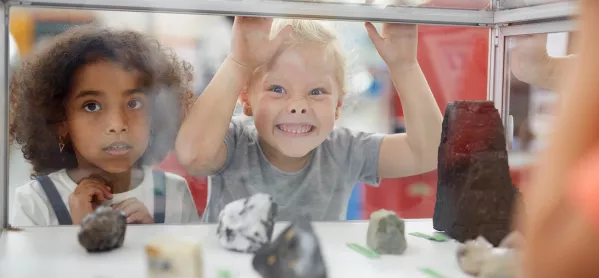- Home
- Want children to remember what you teach? Book a school trip
Want children to remember what you teach? Book a school trip

Love them or hate them, school trips have been part and parcel of the educational system for longer than most of us can recall. How effective trips are as an adjunct to classroom learning, however, remains a pretty hit and miss affair and at times it’s hard to decide if all the effort they entail is really worth it.
A new study from the US (Unger & Fisher, 2019), currently available as a pre-print, could help teachers to understand a little bit more about how real-world environments support and enhance what students are taught in the classroom.
Interestingly, it’s less about the acquisition of facts and more about how knowledge is organised.
Quick read: Professor Dylan Wiliam on what you need to know about memory
Quick listen: Spatial ability - an under-nurtured skill in schools?
Want more articles like this? Join our Tes Teaching and Learning Facebook group
Brain boost
Knowledge acquisition is often thought of as the passing of information from teacher to pupil, to be stored in long-term memory for later retrieval. We refer to these memories as semantic and they represent what we know about a specific item (such as the capital of France is Paris).
But knowledge isn’t necessarily stored like entries in an encyclopaedia, but as an interconnected network organised according to relationships between concepts. This organisation is important for many cognitive processes, including retrieval.
The memory of our lives and our experience of the world (known as autobiographical or episodic memory) differs from semantic memory in a number of ways, yet we know from past research that experience can impact semantic memory.
Better recall
For example, Kayoko Inagaki (Inagaki, 1990) found that children who had experience of raising a pet were better able to reason about the biological properties that different yet related animals might share. John Coley (2012) found similar results when comparing children from urban and rural environments.

Experience and learning, therefore, contribute to the process of semantic organisation; you might have a specific autobiographical memory of when you saw a panther in a zoo, but you don’t necessarily recall when you learned a panther was a jungle cat, was black, or how it was similar to a tiger. Nevertheless, the experience of seeing the panther will help organise all that information you’ve learned.
The researchers of this most recent study were interested in how the experience of a summer ‘zoo camp’ would impact the organisation of memories and how this might lead to faster and more accurate learning.
Zoo trips
In the study, one group of 28 children, aged between four and nine years old, took part in a four-day summer zoo camp, while a second group of 32 children attended a summer camp that was not at a zoo and didn’t involve any animals.
At the beginning of each camp, both groups of children completed tests that measured how well they understood the differences between mammals, birds and reptiles. Children in both groups had the same level of knowledge regarding the three types of animals.
The children in the zoo camp group attended some lessons, but most of their time was spent interacting with preserved and live animals, touring the zoo, playing games and completing craft activities. There was very little explicit teaching about biological taxonomic groups.
By the end of the study, children who had attended the zoo camp displayed a 64 per cent increase on their test scores from before the camp. Children who attended the other camp showed no change.
Return on investment?
This might seem pretty obvious, seeing as the zoo group were given the opportunity to learn more while attending the camp, but what surprised the researchers particularly was the speed at which this increased knowledge acquisition occurred, literally within days.
The lead researcher of the study, Layla Unger, explains this rapid change in terms of knowledge organisation rather than just knowledge acquisition. The children weren’t simply taught facts, such as ostriches are birds but, rather, they experienced how different birds such as ostriches and ducks are related to each other, even though they look very different.
This knowledge organisation helps children retrieve what they have learned from memory and also helps them to reason on the basis of what they learned, helping to integrate new information.
Advantage gap
Even though the zoo summer camp was designed to provide children with real-world experiences, it remained highly structured and arranged around a series of discrete topics. This would indicate that in order to get the full benefit from school trips, learning outcomes need careful consideration.
It’s important to note that the samples used in the study are small and the effects might not be the same if the study was to be repeated with a larger sample.
We also, as yet, don’t know if these results can be replicated in areas of learning other than the one tested, that is, learning about categories of animals.
Finally, as the authors point out, parents often have to pay for their children to attend these types of camps, so there is always the danger that only the children from wealthier families will benefit.
Planning better trips
Despite these weaknesses, the study does suggest that real-world experiences can lead to rapid changes in memory organisation.
So how can we get the most out of school trips?
- Plan outcomes carefully and consider what students are expected to get from the experience
- Combine structured activities with real-world hands-on experiences
- Make explicit connections between what students might have been taught in the classroom with their experiences in the real world
So when you’re next trying to justify taking your students out for the day, you can now back up the request with some science.
Marc Smith is a chartered psychologist and teacher. He is the author of The Emotional Learner and Psychology in the Classroom (with Jonathan Firth). He tweets @marcxsmith
Further reading
- Memory techniques from edu-blogger Claire Sealey
- Do pictures really help with learning?
- How to make the learning stick
Keep reading for just £1 per month
You've reached your limit of free articles this month. Subscribe for £1 per month for three months and get:
- Unlimited access to all Tes magazine content
- Exclusive subscriber-only stories
- Award-winning email newsletters



